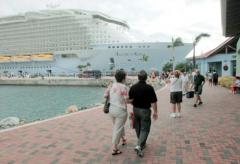A Florida federal judge threw out a lawsuit against Royal Caribbean that alleged fraudulent behavior in which the company's executives were accused of “artificially inflating the company’s stock price by concealing lagging bookings”.
 District Judge Kathleen M. Williams said the plaintiffs couldn’t prove the cruise company knowingly took such action, which was specifically over activity in the European and Mediterranean markets.
District Judge Kathleen M. Williams said the plaintiffs couldn’t prove the cruise company knowingly took such action, which was specifically over activity in the European and Mediterranean markets.
In addition, the judge said Royal Caribbean was protected by safe harbor provisions under the Private Securities Litigation Reform Act. This is because the firm included forward looking statements in its earnings conference calls and filings with US Securities and Exchange Commission that weren’t boilerplate, which the plaintiff had argued.
“The court finds that these warnings were given in advance of the risks materializing and thus are sufficient to protect defendants under the PSLRA’S safe harbor provision,” Judge Williams said. “Therefore, having found that the allegedly misleading statements were forward looking and were accompanied by meaningful cautionary language, dismissal is appropriate.”
Judge Williams said Royal Caribbean specified in its Form 10-K filings with the SEC that operating internationally brought with it risks of “volatile local political conditions,” the possibility of decreased demand because of “fear of hostilities and resulting political instability” and “effects from “economic or geo-political factors beyond our control.”
“The warnings, which went back to 2009 before the Arab Spring and Japanese tsunami, cautioned investors that the company operated internationally in the travel industry and thus was subject to the uncontrollable factors of political and economic instability and port availability,” Judge Williams said. “Moreover, because the company is a leisure company, its success is dependent on its customers’ financial situations and fluctuating ability to afford vacations in difficult economic times.”




